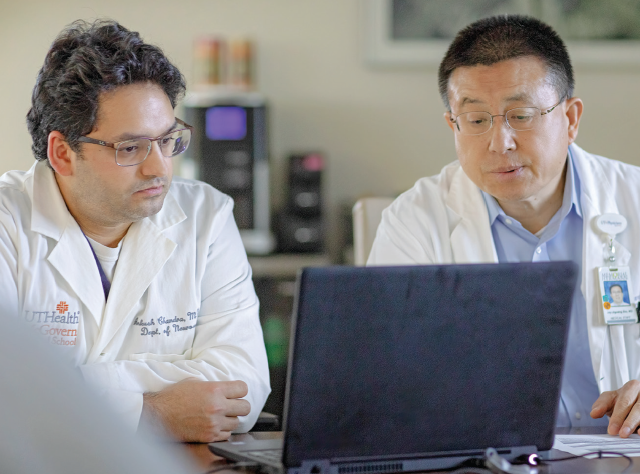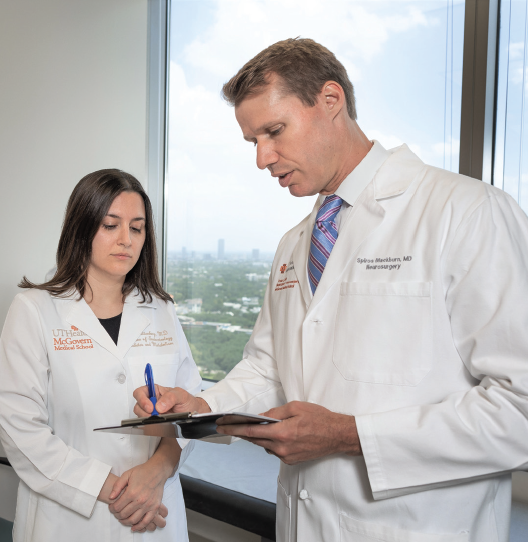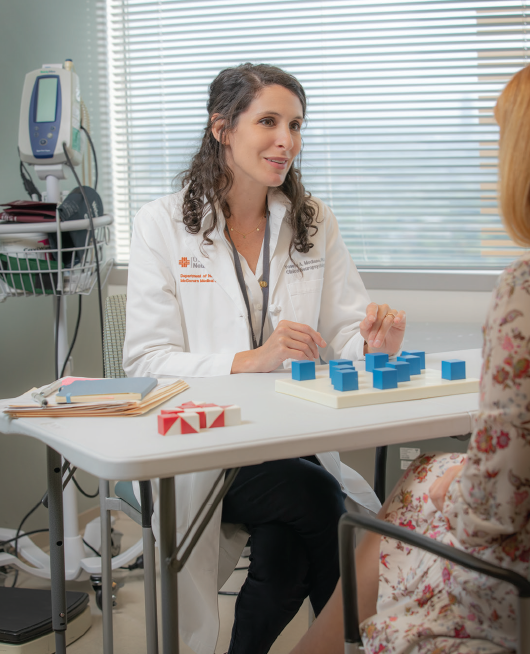Multidisciplinary Programs Provide Convenience and a Broader View of Health to Physicians and Patients

McGovern Medical School at UTHealth Houston, UT Physicians, and UTHealth Houston Neurosciences offer patients many multidisciplinary programs that combine streamlined treatment pathways and reduction in duplication of services. The improved coordination of care provided by multidisciplinary teams whose members respect and trust each other ensures patients the most comprehensive care possible, at the right time and place for each patient.
At the Brain Tumor Center, a highly synchronized team works together to achieve timely determination of glioblastoma multiforme (GBM) at recurrence, followed by a decisive combination of therapies for each patient’s diagnosis. A strong, supportive patient and family education program, along with individualized treatment plans, has extended the average lifespan of GBM patients at UTHealth Houston Neurosciences from the national average of 11 months to 18.2 months.

Neuro-oncologist Dr. Jay-Jiguang Zhu (right) reviews cases at UTHealth Houston Neurosciences’ weekly Brain Tumor Board with Dr. Ankush Chandra, a resident in the Vivian L. Smith Department of Neurosurgery.
“Our success in treating GBM patients is not due to clinical trials, which only a small number of patients are eligible to participate in. Instead, it’s due to our team approach and the quality of care we provide,” says Jay-Jiguang Zhu, MD, PhD, professor in the Vivian L. Smith Department of Neurosurgery at McGovern Medical School and director of neuro-oncology at UTHealth Houston Neurosciences. “Many GBM patients are ineligible for clinical trials due to significant comorbidity or neurological disability as assessed by the Karnofsky Performance Status Scale (KPS), or because of lack of insurance. Some also face travel restrictions.”
“What truly sets us apart is our continuous patient and caregiver education and communication, timely detection of GBM recurrence, and decisive intervention with individualized plans based on age, KPS, tumor location and gene mutation profile,” Zhu adds. “By combining the knowledge and expertise of all our treating physicians with advanced brain tumor imaging MRI and in-depth multidisciplinary tumor board discussions, we can quickly intercept GBM progression and prevent the development of new neurological impairment in our patients through fast intervention. This approach helps preserve our patients’ functional capacity and quality of life for as long as possible.”

Dr. Blackburn and Dr. Guttenberg collaborate on a patient case in the Pituitary Tumor Center.
The Pituitary Tumor Center brings together the expertise of neurosurgeons, endocrinologists, otorhinolaryngologists, neuro ophthalmologists, neuroradiologists, radiation oncologists, and pathologists. The center is led by Spiros Blackburn, MD, associate professor and residency program director in the Vivian L. Smith Department of Neurosurgery, who works closely with endocrinologist Katie Guttenberg, MD, associate professor of internal medicine in the Division of Endocrinology, Diabetes, and Metabolism. Guttenberg leads the medical school’s monthly pituitary conference, with specialists attending from neurosurgery, endocrinology, neuroradiology, and neuropathology.
“We review surgical cases from the previous month and discuss clinical questions related to upcoming cases,” Blackburn says. “These lesions may cause a diverse array of disorders and present with a variety of symptoms, including hormonal changes, vision loss, and infertility, making an early and precise diagnosis essential to treatment. The multidisciplinary viewpoint ensures the most comprehensive care available at the right place and time for each patient.”
For patients who need endoscopic skull base surgery, Blackburn operates in tandem with William C. Yao, MD, associate professor in the Department of Otorhinolaryngology-Head and Neck Surgery, using advanced camera technology to perform many surgeries through the nose, avoiding a scalp incision and brain exposure. They also work in collaboration with Memorial Hermann-Texas Medical Center to offer patients treatment with the Leksell Gamma Knife® Elekta Esprit, which improves treatment planning and patient comfort, and reduces treatment time.
On the cerebrovascular service, Sunil A. Sheth, MD, associate professor of neurology, is director of the Vascular Neurology Program at UTHealth Houston Neurosciences, and director of the Stroke System of Care for the Memorial Hermann Health System. In the last year, the Vascular Neurology Program has expanded its coverage to provide in-person expertise at multiple additional hospitals throughout the city, including Memorial Hermann Greater Heights Hospital and Memorial Hermann Sugar Land Hospital. Sheth also oversees data capture and quality-of-care metrics at all these facilities to ensure that top care is provided at every site UTHealth Houston Neurosciences supports. This allows sites without stroke coverage to access higher-level expertise and streamlines transfers for outlying sites to ensure access to thrombectomy.
UTHealth Houston Neurosciences’ cerebrovascular continuum of care begins with pre-hospital ambulance care and the emergency center, and extends through a dedicated inpatient stroke unit, to neurorehabilitation at Memorial Hermann-TMC and at its sister hospital TIRR Memorial Hermann, an international leader in rehabilitation and research. Patients benefit from comprehensive outpatient cerebrovascular disease and risk factor management through several multidisciplinary clinics overseen by Anjail Sharrief, MD, MPH, professor of neurology and director of stroke prevention for the UTHealth Houston Institute for Stroke and Cerebrovascular Diseases, who also is the founding director of the Stroke Transitions Education and Prevention (STEP) Program.
“Through the STEP Program, our practitioners aim to reduce the risk of stroke while improving the quality of life of stroke survivors through risk-factor control and post-stroke complication management,” says Sharrief, who also is director of stroke prevention in the Department of Neurology and co-director of the Heart-Brain Program, a multidisciplinary collaboration in the Departments of Neurology and the Division of Cardiovascular Medicine. Sharrief was recently awarded a large grant from the National Institutes of Health to develop novel telehealth-based interventions to decrease inequities in stroke care and outcomes.
Neurosurgeons in the Vivian L. Smith Department of Neurosurgery work closely with the department’s Pain Management Program, where interventional pain management specialists treat patients with acute and chronic pain arising from trauma, nerve damage, degenerative conditions, cancer, and systemic metabolic disorders such as diabetes. The goal is always to use the most conservative treatments first.
Nadya Dhanani, MD, who heads the program and has expertise in all aspects of pain medicine, focuses her practice on spine pain. “We are continuously working as clinicians, researchers, and educators to advance the specialty of pain management,” says Dhanani, who sees patients at UTHealth Houston Neurosciences locations in the Texas Medical Center and Greater Heights. “Pain management is very data-driven and evidence-based, but a lot of what we do is also an art. Because it’s a fairly new field, there’s so much potential and much that we’re continuing to learn by working with our patients. We always strive to offer effective conservative treatment options tailored to their diagnosis, before considering surgical intervention, which is why we work closely with neurosurgeons.”
Other key members of the interventional pain management program at UTHealth Houston Neurosciences are Ashley Amsbaugh, MD, and Hiral Patel, MD, both part of the Vivian L. Smith Department of Neurosurgery. Amsbaugh practices at the group’s Texas Medical Center location, and Patel has expanded Texas Medical Center expertise to UTHealth Houston Neurosciences clinics in Southeast Houston and Sugar Land.
Mark Burish, MD, PhD, associate professor in the Vivian L. Smith Department of Neurosurgery, directs the Will Erwin Headache Research Center at McGovern Medical School. Established with a $20 million pledge from the Will Erwin Headache Research Foundation, the center includes experts dedicated to the study of cluster headaches and other debilitating headaches and facial pain diseases. Seung-Hee Yoo, PhD, associate professor in the Department of Biochemistry and Molecular Biology, works with Burish at the Will Erwin Headache Research Center.
“Because migraine, cluster headache, and other debilitating types of headaches are under researched, we collaborate with centers across the country to identify patients with the goal of better understanding and treating the disorders,” Burish says. “At the Will Erwin Center, we continue to raise funds to support research.”

Dr. Modiano performs neuropsychological evaluations on surgical patients to help establish the epileptogenic zone and locate the origins of specific deficits.
Yosefa Modiano, PhD, assistant professor of clinical neuropsychology at McGovern Medical School, holds a joint appointment in the Vivian L. Smith Department of Neurosurgery and the Texas Institute for Restorative Neurotechnologies (TIRN), a multidisciplinary role that marries best practices in clinical care with collaborative research. Part of the Texas Comprehensive Epilepsy Program (TCEP), she specializes in assessing cognition and mood in patients undergoing neurosurgical treatment with a focus on epilepsy and brain tumor.
“Neuropsychology is focused on advancing our understanding of brain-behavior relationships, and these conditions allow us clear sightlines to these functions,” Modiano says. “In patients with focal epilepsy, for instance, we can help establish the epileptogenic zone based on cognitive patterns and locate the origin of specific deficits. Considering the cognitive and behavioral features alongside other clinical aspects of epilepsy also allows us to understand patients holistically and provide better care. The goal after surgical treatment is to help patients return to their lives and pursue activities that they find meaningful.”
The Texas Comprehensive Epilepsy Program is a collaboration between UTHealth Houston Neurosciences, McGovern Medical School at UTHealth Houston, Memorial Hermann-Texas Medical Center, and Children’s Memorial Hermann Hospital. Designated a Level 4 program, the highest such designation, by the National Association of Epilepsy Centers, TCEP is the leading program in the southwestern United States for the diagnosis and surgical and medical treatment of all types of epilepsy.
The Program’s multidisciplinary team of highly trained epileptologists, neurosurgeons, nurses, neuropsychologists, neuroradiologists, neuropathologists and engineers ensure the highest quality care for our patients. Our experienced, board-certified epileptologists and neurosurgeons are internationally renowned leaders in the field, and the epilepsy surgery program is one of the busiest in the country, with a high volume of national and international referrals. The program offers patients a full suite of investigational tools, including high resolution MRI, magnetoencephalography, PET and SPECT imaging, stereotactic electroencephalography, and an advanced Epilepsy Monitoring Unit. The latest technologies in minimally invasive surgeries are available, including laser interstitial thermal therapy, responsive neurostimulation, and deep brain stimulation. Patients of all ages come to TCEP from across the nation for innovative care and quality outcomes.
In This Section:
Features:
- True to Our Values
- The Heart-Brain Program: A Closed-Loop Continuum of Care to Patients with PFO-Associated Stroke
- Multidisciplinary Programs Provide Convenience and a Broader View of Health to Physicians and Patients
Patient Stories:
- Alabama Woman Finally Gets a Sleep Disorder Diagnosis Through Telehealth
- Radiofrequency Ablation (RFA) for severe back pain
- Finally Getting a Good Night’s Sleep with remedē®
- Making a Difference by Participating in Huntington’s Disease Research
Research & Trials:
- Sensitizing Tumors to Radiation Therapy Using Gold Nanoparticles
- An Investigation: Th-1 Dendritic Cell Immunotherapy in Combination with Standard Chemoradiation for Adjuvant Treatment of Adult Glioblastoma
- Advances in the Diagnosis and Management of Cluster Headache
- AI-Powered Algorithms May Help Detect Unruptured Brain Aneurysms
Accolades & News:
- Department of Neurosurgery Ranks 4th in NIH Funding Among US Clinical Science Departments
- McCullough Wins Stroke Association Lecture Award
- UTMOVE Receives Distinguished Edmond J. Safra Fellowship in Movement Disorders
- Schiess Awarded UTHealth Houston President’s Scholar Award
- Burish Co-Chairs the AHS Scientific Program Committee
- Furr Stimming Named HSG Outstanding Investigator
- Lo Receives UT System STARs Award
- Burish Assumes Responsibility for Neurology Residency Training for Headache Medicine
- Morcos Named Chair of Neurosurgery











